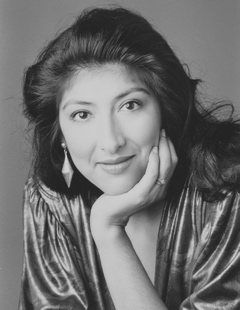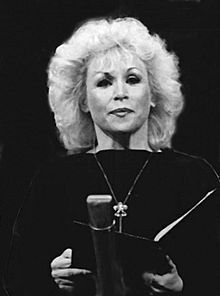
Anja Silja Regina Langwagen is a German soprano singer.

Siegfried Matthus was a German composer, conductor, and festival founder and manager. Some of his operas, such as Judith, were premiered at the Komische Oper Berlin in East Berlin. In 1991, he founded the chamber opera festival Kammeroper Schloss Rheinsberg and directed it until 2018. In 2005, he composed a Te Deum for the reopening of the Dresden Frauenkirche. Matthus is considered one of Germany's most often performed contemporary composers.
Harry Alfred Robert Kupfer was a German opera director and academic. A long-time director at the Komische Oper Berlin, he worked at major opera houses and at festivals internationally. Trained by Walter Felsenstein, he worked in the tradition of realistic directing. At the Bayreuth Festival, he staged Wagner's Der fliegende Holländer in 1978 and Der Ring des Nibelungen in 1988. At the Salzburg Festival, he directed the premiere of Penderecki's Die schwarze Maske in 1986 and Der Rosenkavalier by Richard Strauss in 2014.

Hildegard Behrens was a German operatic soprano with a wide repertoire including Wagner, Weber, Mozart, Richard Strauss, and Alban Berg roles. She performed at major opera houses around the world, and received several Grammy Awards for performances with the Metropolitan Opera.

Milagro Vargas is an American mezzo-soprano known for her distinctive voice and stage presence. She has appeared as an international soloist in operatic, orchestral, chamber music and recital settings.
Eva Johansson is a Danish operatic soprano.
Nadine Secunde is an American operatic soprano. She studied and performed in Germany, singing at the Bayreuth Festival the leading role of Elsa in Lohengrin and Sieglinde in Die Walküre, and made an international career. A specialist for the works of Wagner and Richard Strauss, she has also performed contemporary operas such as the title role of Judith by Siegfried Matthus at the Seattle Opera in the work's U.S. premiere.
Claudia Mahnke is a German operatic mezzo-soprano, a member of the Oper Frankfurt, with guest appearances at leading opera houses and the Bayreuth Festival.
Sophie Koch is a French operatic mezzo-soprano who made an international career, performing Rosina in Rossini's Il barbiere di Siviglia at the Royal Opera House, the Composer in Ariadne auf Naxos by Richard Strauss at the Semperoper in Dresden, and Charlotte in Massenet's Werther at the Paris Opera, among others. Octavian in Der Rosenkavalier by Richard Strauss became her signature role. She has also performed in concert and recital, and made recordings.
Ute Vinzing is a German dramatic soprano who received the title Kammersängerin. She is known for roles such as Wagner's Brünnhilde, Isolde, Ortrud and Kundry, and for Elektra and the Dyer's Wife by Richard Strauss, which she performed at international stages.

Claire Born was a German operatic soprano. A long-term member of the Vienna State Opera and the Semperoper in Dresden, she appeared at leading international opera houses and festivals, in roles such as Donna Elvira in Mozart's Don Giovanni, Eva in Wagner's Die Meistersinger von Nürnberg and the title role of Ariadne auf Naxos. She performed in world premieres including Hindemith's Cardillac and Othmar Schoeck's Vom Fischer un syner Fru.
Luise Helletsgruber was an Austrian operatic soprano, who performed at the Vienna State Opera, the Salzburg Festival and the Glyndebourne Festival Opera.

Melitta Muszely was an Austrian operatic soprano and a voice teacher. She made a career based in Germany, mainly at the Hamburg State Opera with guest contracts to the Komische Oper Berlin and the Vienna State Opera, among others. She took part in world premieres, and performed internationally in Europe. She appeared as all four female characters in Offenbach's Hoffmanns Erzählungen in the legendary 1958 production by Walter Felsenstein, and sang recitals until 2008.
Sigrid Kehl is a German operatic soprano and mezzo-soprano.
Rolf Reuter was a German conductor.

Judith is an opera in two acts by Siegfried Matthus with a libretto by the composer based on Friedrich Hebbel's Judith and texts from the Old Testament. The premiere was on 28 September 1985 at the Komische Oper Berlin, directed by Harry Kupfer. It was recorded in a studio production.
Uta Priew is a German operatic mezzo-soprano.

Ute Trekel-Burckhardt is a German operatic mezzo-soprano. She was a long-time lead soloist of the Staatsoper Unter den Linden in East Berlin. She took part in world premieres such as Noch einen Löffel Gift, Liebling? by Siegfried Matthus and Heinrich Sutermeister's Le Roi Bérenger. Even before the fall of the Berlin Wall, she appeared internationally, including the Vienna State Opera in her signature role, the tile role of Der Rosenkavalier, and at Opéra de Nancy in Schönberg's Erwartung.
Irmgard Vilsmaier is a German operatic soprano.
Camilla Kallab was an Austrian and later German operatic mezzo-soprano who appeared internationally.







